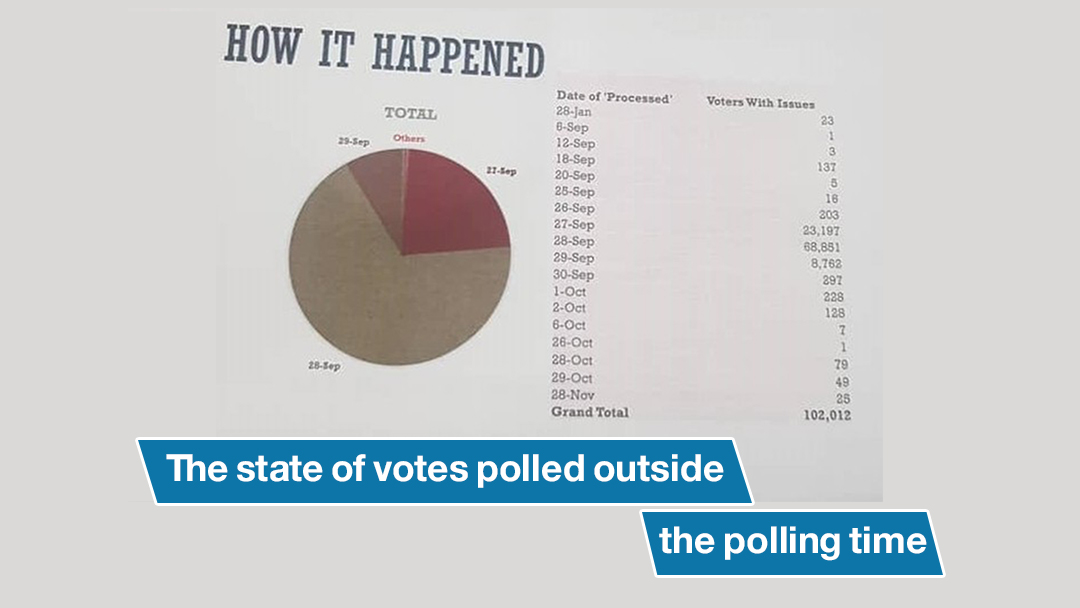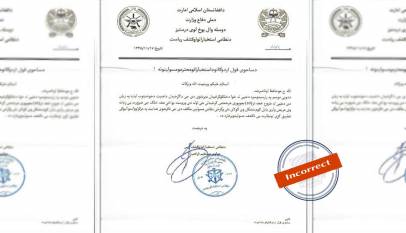The state of votes polled outside the polling time
KABUL (Pajhwok): Pajhwok Afghan News has obtained complete information from the Independent Election Commission (IEC) regarding the 102,012 votes cast outside the official polling time.
‘Votes outside the time’ are called for those ballots that have been cast before 7:00am and after 5:00pm on Election Day, September 28, in the polling stations.
In line with the IEC rules and regulations for polling, polling started from 7:00 am on Election Day and continued till 3:00 pm, but the IEC on Election Day extended the polling period for another two hours and announced that voters could cast ballots for their candidate till 5:00 pm.
Analysis of the polling patterns by the IEC and Dermalog company, however, revealed that the voter verification devices recorded a variety of dates and times for when polling took place. According to the analysis, more than 7,300 polling stations were affected across all 34 provinces, which required a deeper analysis to determine if the out of polling time was accidental or an indication of irregularity.
IEC Polling Data Time Analysis:
The IEC briefed Pajhwok Afghan News and explained that 47,534 voters were recorded as polling before 7:00 am, while 54,478 voters were shown as polling after 5:00 pm on September 28 in 7,354 polling stations. The total number of voters voted outside the polling time is 102,012.
A total of 68,851 votes were recorded as casted outside the time on September 28, 23,197 votes were casted a day before on September 27, and 8,762 votes were casted a day after on September 29. The remaining 1,202 voters were recorded as polling between January 28 till November 28, 2019.
Ten provinces where more votes before and after the polling time were shown as casted are Kandahar (12,691), Kabul (10,003), Herat (9,247), Nangarhar (7,279), Helmand (5,861), Daikundi (5,775), Takhar (4,687), Paktia (4,093), Khost (3,950) and Badakhshan (3,934).
Other provinces with outside the time votes are Paktika (3,605), Ghor (3,548), Nuristan (2,848), Bamyan (2,153), Baghlan (2,089), Faryab (2,057), Farah (1,874), Zabul (1,818), Ghazni (1,566), Balkh (1,553), Sar-e-Pul (1,344), Jawzjan (1,319), Logar (1,238), Parwan (1,019), Kunar (924), Samangan (872), Laghman (798), Maidan Wardak (765), Nimroz (707), Panjshir (685), Badghis (661), Uruzgan (509), Kapisa (401) and Kunduz (139).
The IEC maintains that most of the out of polling time cases could be explained as technical issues with the voter verification devices not being set to the correct date and time, but their operation showed reasonable usage to engage in polling on Election Day. There were some polling stations, however, that showed possible irregularities.
The IEC issued Decision No. 109-2019 on 15 November that ordered for the 262 polling stations with 13,929 biometric data sets recorded as out of polling time to be audited and recounted and invalidated in case they are proven fraudulent. In addition, the IEC ordered that the other 7,092 polling stations with out of polling time records were shown to be reasonably explained by the following detailed analysis and would be considered as genuine polling exercises.
The IEC presentation and explanation differentiated the information into four classes and 15 categories.
CLASS ONE: UNLIKELY TO BE CAUSED BY IRREGULARITIES
The Class 1 maintains three categories in which total 29,312 votes casted in 6053 polling stations. 362 of these votes polled before 7:00 am, while 28,950 of these votes polled after 5:00 pm of polling time.
First category:
- Started polling at 7 am and polled past 5 pm on a continuous basis (without breaks outside regular hours).
- In 5,912 polling stations, 28,819 votes polled after 5:00 pm
Second category:
- Started polling slightly before 6:00am and polled regularly with some slight polling after 5:00 pm (without breaks outside the regular hours).
- In 22 polling stations, 72 votes polled before the polling time while 131 votes polled after the polling time
Third category:
- Started polling slightly before 6:00am and stopped polling within regular hours (without breaks outside regular hours).
- In 119 polling station, 290 votes polled before 7:00am
CLASS TWO: EVIDENT DATA TIME ISSUE
The class 2 maintains five categories in which 53,903 votes casted in 850 polling stations. 40,960 of these votes polled before 7:00 am, while 12,943 of these votes polled after 5:00pm.
Fourth category:
- Votes cast on wrong dates (before 26th and after 30th September 2019)
- In 19 polling stations 158 votes polled before the start of election time while 172 polled after the election time
Fifth category:
- AM/PM misconfiguration (devices starting polling at 7:00pm instead of 7:00am)
- In 516 polling stations, 29,749 votes polled before 7:00am, while 10,199 votes polled after 5:00pm
Sixth category:
- AM/PM misconfiguration (Devices starting polling at 6:00pm instead of 6:00am)
- In 13 polling stations, 581 votes polled before 7:00am and 178 votes polled after 5:00pm.
Seventh category:
- Devices polling before 7:00 am on the 28th but work around 10-11 hours of polling
- In 259 polling station 10,472 votes polled before 7:00am
Eighth category:
- Devices recorded that polling started after 7am of the 28th of September, operated for between 2 and 11 hours. With reasonable gap between voters
- In 43 polling stations, 2,394 votes polled after 5:00pm
CLASS THREE: POSSIBLE IRREGULARITIES
In the three categories of class three, 13949 votes polled in 262 polling stations. 4773 of these votes polled before the start of polling time, while 9176 polled after the end of polling.
Ninth category:
- Started polling at the normal time. Stopped polling on time then restarted polling much later in the night
- In 93 polling stations, 5299 votes polled after 5:00 pm
Tenth category:
- Started polling at the much earlier in the morning than the scheduled start of the polling- stopped polling. Then started at the expected time when polling was to start then polled in a regular manner then stopped on time.
- That is why in 87 polling stations, 3,211 votes polled before 7:00 am
Eleventh category:
- Started polling at the much earlier than the scheduled start of polling. Stopped polling then started at the expected time of polling and proceeded with polling after time.
- In 82 polling stations, 1562 votes polled before 7:00 am, while 3,877 votes polled after 5:00 pm.
CLASS FOUR: INCONCLUSIVE
In the three categories of class four 4,848 votes polled in 189 polling station with 1,439 before 7:00 am and 3,409 after 5:00pm.
Twelfth category:
- Voting starts after 5:00 pm and results are captured within hours of final voter being processed
- In 20 polling stations, 299 votes polled after 5:00 pm
Thirteenth category:
- Voting starts later than 5:00 pm. Results are captured after in Kabul. No reference to result capture time
- In nine polling stations 611 votes polled after 5:00 pm
Fourteenth category:
- Devices that started polling before 7am of the 28th of September operated for less than 13 hours. Captured results less than 10 hours after last voter
- In 49 polling stations, 673 votes polled before 7:00 am
Fifteenth category:
- Polling stations that could not automatically fall into any of the above categories but because of limitation of time could not be adjudicated on a case by case basis
- In 111 polling stations, 766 votes polled before 7:00 am while 2,499 votes polled after 5:00pm
INDEPENDENT ELECTION COMMISSION (IEC)
The IEC in its Decision No. 109-2019 on November 15 said that biometric information regarding 102,012 votes outside the polling time was due to technical problem caused by disorder in the timing of voter verification devices. The continuation in the registration of information showed that there were no chances of violation, disorder or rigging.
The decision further said that in 262 polling stations where 13,929 biometric information had been registered after the polling time and indicated chances of disorder would be audited and recounted. If fraud and rigging was proved, these votes would be invalidated.
The biometric information of the remaining 7,092 polling stations from different provinces was due to technical fault in the timing of biometric devices. This information is part of the white list shared by the Dermalog Company.
It is worth mentioning that two IEC Commissioners Mawlana Abdullah and Rahima Zarifi did not sign the IEC decision that includes determines actions during the audit and recount of votes.
This comes as Sayed Abdul Ahad Rishtia, Deputy IEC Secretary when speaking on November 18 about the state of over 102,012 biometric votes during a meeting with media representatives, said, “Reports obtained from Dermalog Company show that these votes belong to 7,354 polling stations and there is no evidence of fraud about them.”
He said that votes in the ballot boxes audited and recounted based on biometric datasets and other legal norms and only votes with biometric information would be counted as valid.
Votes casted without biometric datasets and against procedures would be invalidated and documented during the audit and recount process, he also said.
Election teams:
Pajhwok Afghan News could not contact with Dr. Abdullah Abdullah’s team despite several attempts for a comment over the issue.
The Abdullah team, however, in a resolution letter on November 6 said that the IEC should deal with four types of so-called fraudulent votes including 137,630 votes of unidentified votes in quarantine, 102,012 votes casted out of official time on the Election Day, votes involving around 700 missing devices and SD cards, and votes with duplicate faces.
Noor Rahman Akhlaqi, in charge of observers of Abdullah’s team, on Tuesday November 19 in a Facebook post about the IEC’s conditions for invalidating votes, said it would have been better if commissioners had read the fourth regulatory criteria for invalidation of votes carefully so they would not violate this condition by accepting over 102,000 votes cast out of time as valid.
The fourth criteria of the IEC’s procedure for invalidating a ballot paper states “the ballot paper with a QR code which is printed outside of polling time” would be invalidated and not counted in the counting process.
Javid Faisal, a spokesman of presidential candidate, Ashraf Ghani called the IEC Decisions Nos. 108 and 109, regarding over 137,000 and 102,000 votes, respectively, and other issues important and said they supported the commission’s conclusions.
He asked other candidates to respect the independency of the IEC and its activities and work for the legitimacy of the process.
On November 9, the IEC announced audit and recount of votes from 8,255 polling stations for investigating suspect polling stations to separate any fraudulent votes from clean ones. The audit/recount process, however, faced opposition from several presidential candidates including Dr. Abdullah Abdullah, Gulbuddin Hekmatyar and Rahmatullah Nabil.
The IEC Decision No. 106-2019 on November 13 stopped the audit and recount process of votes due to criticisms from the candidates and said the announcement of preliminary results of the election would be delayed.
However, the IEC Decision No. 110-2019 on November 17 said that it would resume the audit and recount process of votes after consulting with candidates.
The presidential election was held on September 28. Earlier the IEC had given October 19 the date for announcement of preliminary results while November 7 was projected for announcement of final results of the presidential election.
But due to a variety of technical issues and problems during the processing of results forms, the IEC could not announce the result on its first due date.
On October 27, the IEC said that preliminary results of the presidential election would be announced on November 16, but the commission again delayed the date for an indefinite of time on November 14 due to the delays caused by opposition campaigns in boycotting the audit/recount process and blocking the operations in at least seven provinces.
Azizullah Hamdard
Hits: 10092
Letter regarding ban on roaming during night is fake
KABUL (Pajhwok): The Ministry of Defence (MoD) and an expert have rejected the letter rega…



